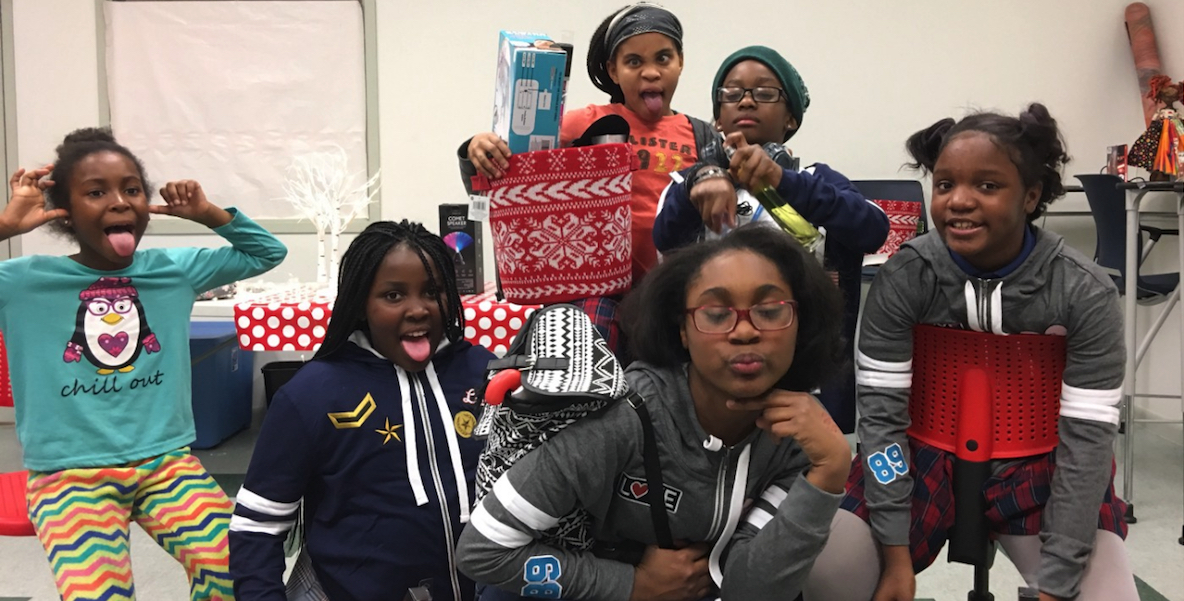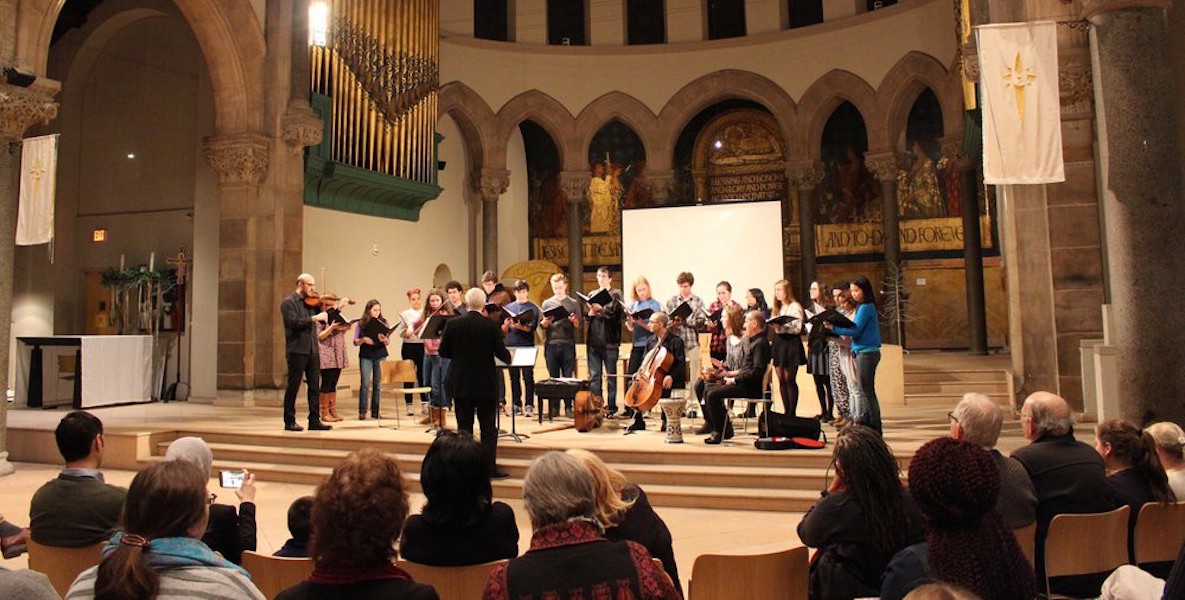On the top floor of Penn Alexander School, Amar looks over the railing with fierce eyes and a furrowed brow that looks as if he’s trying to resolve the personal issues of a 71-year-old man. Amar’s classmate, Christian, has just hurried down to the second floor to check out a school laptop. Amar and I are waiting for his return in an unwalled room of small round tables and chairs.
The school feels like a redesigned, kid-friendly glass barn. Tiers of floors overlook an atrium in the center. Bright walls face one another and many floors feature posters or student run “museums” curated with interpretations of books they have read. The school is vibrant.
My class and I came to Penn Alexander to read our works. Amar and Christian will be critiquing my work and Christian wanted to ensure that he could copy down notes quickly enough, — thus the need for the laptop.
I walk up to Amar. “I’m Jacob,” I say and stand awkwardly next to him against the railing.
“I’m Amar.” Amar puts out his hand.
I shake it.
“You into reading and writing?” I ask.
“Sort of, but I like graphic comics more.”
Little did I know I had unleashed a black hole of comic book talk. Amar and Christian each jumble through their backpacks and pull out a total of four different comic books. Each comic is summarized with wide eyes and over-the-top gestures. Amar stands up at one point, after opening to a page in one of his books, and goes on a small, but powerful, rant on the “amazingness” of the page.
Eventually we refocus, and I read them my last article, “Plugged in, Caffeinated, and Ready to Vote.” I had gone in thinking that their critiques would be semi-serious with some kiddy flair.
I was wrong.
They loved the piece. But their reasons for loving the piece stemmed from my “using of sayings, like the one with ‘spark’ and showing ‘how they feel’ without telling them how to feel.”
They also told me the piece about registering and voting was not confusing.
After I read Amar and Christian my work, we circled back to comics. The two can discuss graphic comics for hours. We talked about so many different comics, the whole conversation feels like a blur.
How are fifth graders more eloquent than politicians? Is it because Mercury’s in retrograde? A byproduct of the current presidency? Or has it always been like this?
But get them started on the politics of the U.S. and…They. Will. Not. Stop.
At the top of their political agenda is the battle against gun violence. A close second is ending homelessness, a project their school, Penn Alexander, is working on with students.
But this political agenda is not just one of wild thoughts and endless, youthful imagination.
Amar and Christian helped lead their school’s march demanding Congress to implement gun reform. Ask Amar about his opinion and perception of the Parkland Shooting and he’ll bring out an arsenal of statistics to throw your way, like that Cruz was 19-years-old, was charged with 17 counts of murder, and was charged with another 17 counts of attempted murder. And Christian will be right behind him with a Penn Alexander laptop to double check figures and facts.
These kids are not messing around. And their political and personal wants are not empty threats.
I ask Amar and Christian what they’d do if teachers had guns in school to protect the students.
Christian says, “I wouldn’t come to school.”
Amar agrees, but then argues, “I’d have to trust them. I have to trust them.”
Christian continues, fidgeting around, “Guns…guns shouldn’t be used to help people.”
Amar raises his hand. Christian looks at Amar and nods. After the nod, Amar says, “I sorta disagree,” and goes on to explain his point.
Christian replies, “I hear what you’re saying. People have the right to bear arms.”
Amar continues, “What age was he?”
“Who?” I ask.
“He’s talking about Nikolas Cruz,” says Christian.
“Oh,” I say. I can feel my face redden. I’m an idiot.
“I think 19,” says Amar. “Wait,” he continues, “how old do you have to be to get a gun?”
“I don’t know,” I say. “It might be different state to state.”
“One sec.” Christian types away on the laptop. “It’s different in different places.” “Like 18 or 21 or 14. But the gun type also.”
And I sit in shock and silence. These kids are so knowledgeable.
The way in which they speak about these issues rests on a foundation of understanding and eloquence. They know what they’re talking about. And if they don’t, they’re unafraid to look it up.
The way in which they speak about these issues rests on a foundation of understanding and eloquence. They know what they’re talking about. And if they don’t, they’re unafraid to look it up. Gun law reform is not just any old issue to them. Gun law reform is at graphic novels level. It may have even surpassed graphic novels level. Amar and Christian are overflowing with passion about these issues, for like many other students around the US, they know their lives could be at stake.
But more so, they are open; not only open to learning new information about gun law reform and the uphill battle for such reform, but they are open to other ways of thinking, other cultural norms. Amar is from Egypt. Christian and I bonded over being a mix of, like, eight different ethnicities. I’m Filipino, German, Czech, Russian, Ukrainian, Manchurian and Spanish. Christian is Italian, Black, and Latino — he went more into the specifics, but I’ve failed to remember.
Even if they cannot fully express it, they are familiar with other places’ norms.
U.S. gun laws are not the global norm. We are an outlier. We talk about American exceptionalism. We talk about human rights not being an issue here. In fact, we don’t talk about human rights. We invented human rights, right?… well maybe. We killed off Native Americans.
We enslaved Africans. All because the humans in power didn’t consider those other humans to be humans — didn’t consider them to need, to have, to be human enough for human rights.
Yet, this power dynamic is still in play. It did not end with genocide of the Native Americans or the abolition of slavery.
Send a team to the jawn Do Something
We are killing ourselves and allowing the systemic continuation of those killings to continue. And to think that gun law reform stands on an infamous platform apart from other U.S.-specific issues, like U.S. racism and U.S. anti-immigrant policies, is a dangerous path. As Charles M. Blow puts it, “America is the gun.”
But, these students are the lock. They want to change America’s being the gun. And they are learning how to speak, think, and act, in order to do so with eloquence.
Compared to the way I spoke at that age, God, I feel like an imbecile. To put things in perspective, my grandmother told me during Passover that she thinks the modern day Pharaoh is technology and that people are slaves to their phones. She had a good point, but maybe not the best wording.
I. Went. Off. How dare she compare slavery to technological addictions? I lost it. No “I hear what you’re saying.” No raising my hand or nodding to my family members. I went ballistic.
These students are the lock. They want to change America’s being the gun. And they are learning how to speak, think, and act, in order to do so with eloquence.
I thought I had acted like a child. But I didn’t. I had acted like an adult. I had acted like a politician.
What is going on?
How are fifth graders more eloquent than politicians? Is it because Mercury’s in retrograde? A byproduct of the current presidency? Or has it always been like this?
Our entire system is flawed.
This summer I had the opportunity to study international environmental diplomacy in Germany and the Netherlands. I learned a lot about methods to fight climate change. However, inadvertently, the trip also opened up my eyes to other forms of democracy.
During my time abroad, it finally hit me that the way we are running things these days is not normal — not only for the U.S., but for democracies across the world.
Safe Kids Stories from The CitizenRead More
Germany and the Netherlands both have their own issues with the messiness of democracy. However, they are anchored in a multi-party system where money plays little or no role in elections.We have two strong money-soaked parties with members ready to claw their opponents’ eyes out. How do we get money out of politics? How do we open up our democracy to more parties? Is this even what we want? Is this what we need?
I don’t know.
But respect for opening up the political arena to new ideas is at least what I’m craving…and it just so happens to be what kids do best.
So, I guess what I’m trying to say is we need less “How dare you?” and more “I hear what you’re saying.”
And more “I sorta disagree.”
Jacob Kind is a sophomore at the University of Pennsylvania studying international relations, creative writing, and Arabic. He works at the Kelly Writers House and CHOP’s Center for Autism Research. He is a volunteer at Fox Chase Cancer Center and a tutor for English.
Photo via Flickr








